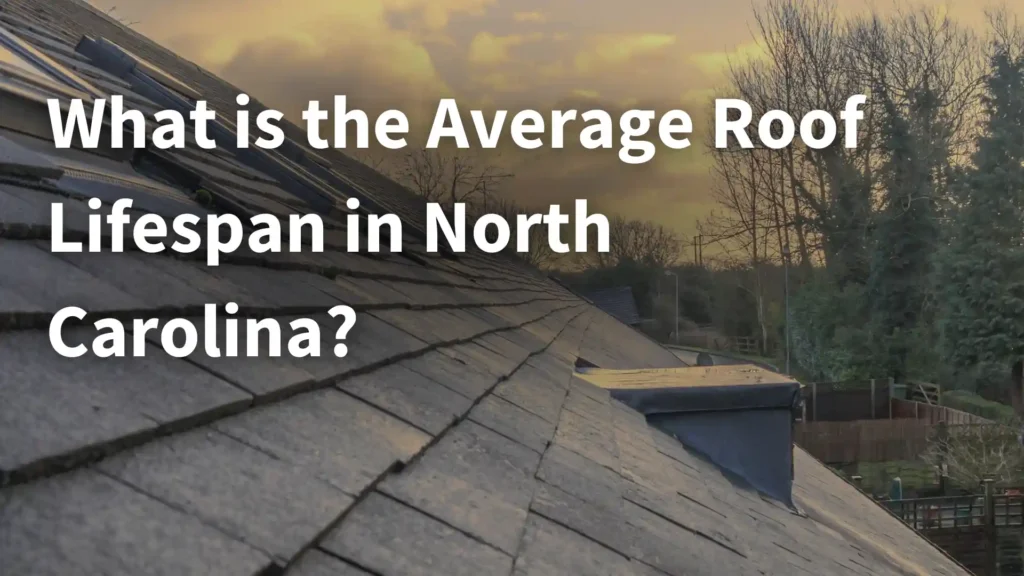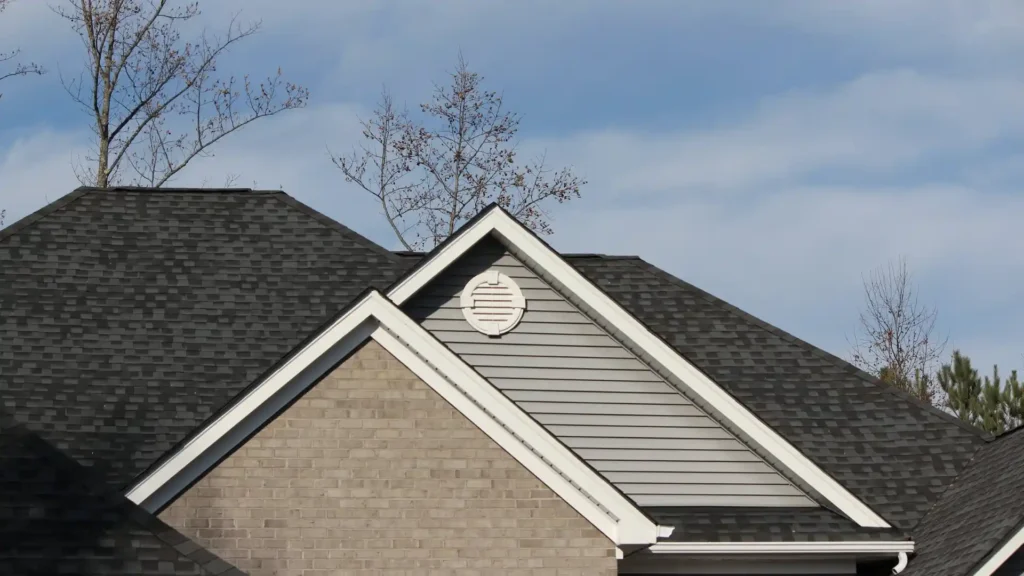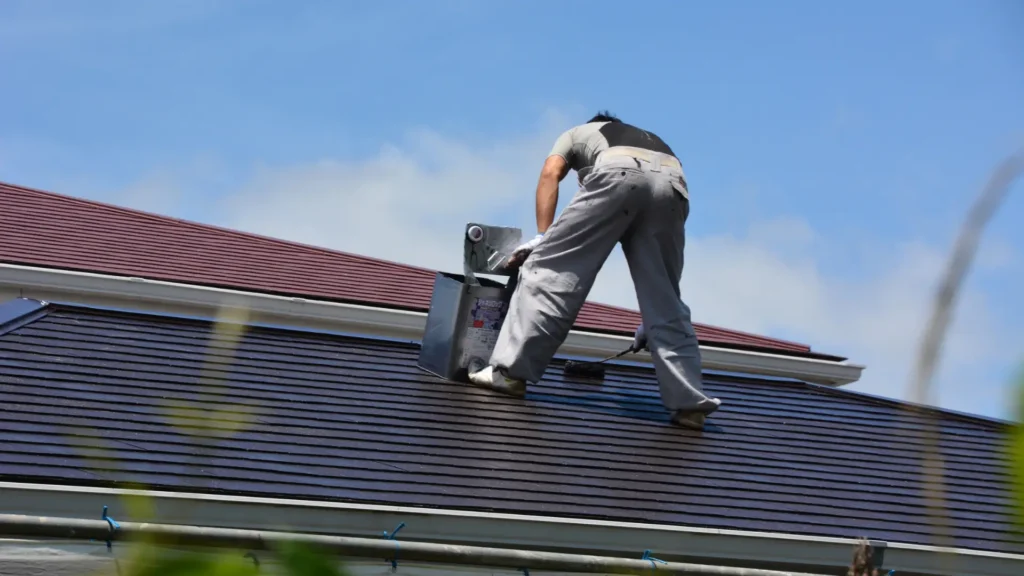
Menu


Repairing or replacing a roof is a significant investment. It's also an investment you don't want to make every few years. You want to trust that your roof will protect you and your family for the long haul. Come rain or shine, your roof is one of the most critical parts of your home.
Understanding the average lifespan of a roof in North Carolina is essential. It can help you prepare and plan for routine maintenance and larger roofing projects. Knowing how long roofing materials last can also help you pick the right products for your roofing job.
Climate can damage your roof, especially if it isn't constructed with the right products and materials. Your roof is your home's first line of defense. In a diverse state like North Carolina, weather patterns significantly affect how long a roof will last. From the mountains to the coast, weather patterns vary widely.
Summers in North Carolina can be long, hot, and humid. Prolonged exposure to UV rays causes roofing shingles to dry out and crack, affecting longevity. Darker-colored roofs also absorb more heat, which can shorten their lifespan compared to lighter shades. In areas along the coast, summer heat and high humidity can also degrade a roof over time. Humidity can promote the growth of mold, algae, and moss, which can break down roofing materials. The persistent moisture can also weaken underlayment and flashing, which may cause leaks that damage roofing materials and the interior of a home.
Hurricanes, coastal winds, and heavy rainfall or storms can also affect a roof's lifespan. Intense storms can rip shingles or entire sections off a roof, and poor material choices or installation techniques can also hurt a roof's lifespan in these storm-prone areas.
North Carolina's heavy pollen season and lush vegetation due to the climate can also affect your home's roof. Falling pine needles and oak leaves can clog gutters and trap moisture on roofs, increasing the risk of mold growth and water damage over time.
North Carolina's mix of heat, humidity, storms, and seasonal shifts makes choosing durable materials designed for the state's climate vital. Picking algae-resistant shingles, impact-resistant options, or proper ventilation can extend your roof's lifespan. It can also help prevent costly repairs and replacements.
Most standard 3-tab shingles last 15 to 20 years. However, depending on installation and conditions, some manufacturers say asphalt shingles can last up to 30 years. Architectural or dimensional shingles are more durable and have an average lifespan of 25 to 30 years.
Although an attractive and classic option, wood shakes and shingles last only 20 to 40 years. They can also be high-maintenance, especially in North Carolina due to the heat and humidity.
Metal roofing offers a classic look that lasts over 40 years or more, depending on the alloy and maintenance. Homes in coastal areas of North Carolina benefit from corrosion-resistant metals like aluminum, stainless steel, or coated steel.
Tile roofs are durable and typically last 50 years or more. High-quality clay and slate tiles, with low porosity and durability, can even exceed that timeframe.
In North Carolina, slate roofs are also a durable and long-lasting option. A slate roof may last 50 to 100 years, but some claim it can last longer when properly maintained.
Composite or synthetic shingles often have 40 to 50-year lifespans. Synthetic materials balance durability and affordability.
EPDM or rubber roofing membranes can last up to 20 years. TPO and PVC membranes may top out at 20 to 30 years.
Homeowners must remember that North Carolina's varied climate and a homeowner's maintenance efforts can significantly impact the lifespan of roofing materials.

Weather and materials aren't the only factors that impact a roof's longevity. The environment, installation, and care it receives also shape its lifespan. How you install and maintain a roof goes a long way in determining how long it will last and protect your most significant investment: your home. Some of the factors that affect the longevity of a North Carolina roof include:
From heat and UV exposure to storms and hurricanes, the weather in North Carolina can do a number on your roof.
Weather isn't the only environmental concern homeowners need to consider. Coastal homes face salt air corrosion, which can wear down metal roofing unless coated or corrosion-resistant.Falling leaves, pine needles, and heavy pollen in wooded areas can trap moisture and encourage algae or moss growth.
While the weather significantly affects how long a roof lasts, so does the material used. Specific products stand up better to certain weather conditions. Using the right materials for the job makes a difference.
Higher-quality shingles or tiles offer better performance and last longer. Another benefit of higher-quality materials is that they are often backed by stronger warranties. Choosing a trusted brand and certified installer can add years to a roof's average lifespan.
Even the best roofing materials won't last if they're poorly installed. Poor installation techniques can cause leaks, premature deterioration of materials, mold, and structural issues.
Proper ventilation installation and the use of the right insulating materials are essential. These systems prevent heat and moisture buildup, which can weaken shingles below. Poor airflow can shorten a roof's lifespan and degrade roofing materials early.
Regular cleaning and maintenance are essential for extending a roof's lifespan. Clogged gutters, algae growth, and storm debris can damage roofing materials, leading to leaks and other issues. Periodic roofing inspections can also help catch minor problems, like lifted shingles, before they become major damage.
The experts at Integrity Roofing want to help you extend the life of your roof. Our commitment to quality and craftsmanship, combined with the high-quality materials we use, ensures that your roof will stand the test of time.
Contact Integrity Roofing today for a free inspection. We proudly serve Hickory, Piedmont, and Western North Carolina.
Related Posts:
 December 23, 2025
Roofing Inspection Checklist: Your Complete Guide to Preparing for the Inspection
December 23, 2025
Roofing Inspection Checklist: Your Complete Guide to Preparing for the Inspection
Since 2017, has been the trusted roofing contractor for homeowners and businesses throughout the Piedmont and Western North Carolina regions, including Hickory and Charlotte. A…
Read More